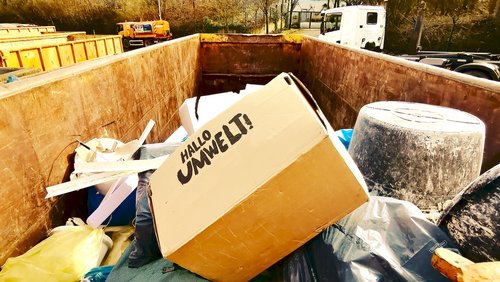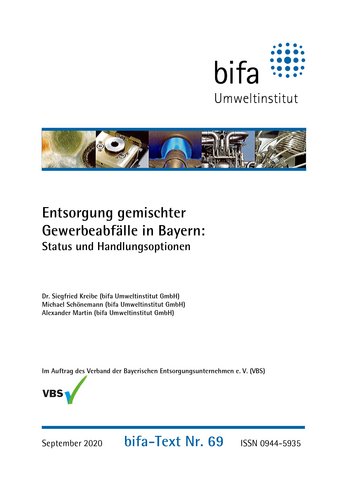VBS e.V.: Mixed commercial waste in Bavaria
Before the outbreak of the Corona pandemic, many waste management companies had problems accommodating mixed commercial waste for energy recovery. Their storage capacities were often at their limits.

After the end of the pandemic, the situation will quickly return to the way it was before. On behalf of the Association of Bavarian Waste Management Companies e.V. (VBS), bifa examined the situation in Bavaria and options for easing the situation. The study was published in the bifa-Texte series.
Based on literature data, bifa estimates the amount of mixed household-type commercial waste in Bavaria at 925,000 Mg/a. Of this, about 370,000 Mg go to sorting plants, 425,000 Mg directly to thermal recycling and 130,000 Mg to other plants. An operator survey carried out together with the VBS showed a capacity of about 800,000 Mg/a for Bavarian sorting plants for such waste, about half of which is currently being utilised.
The causes of the scarce incineration capacities are, among other things, population and economic growth, the loss of incineration capacities due to the coal phase-out, the reduction of waste quantities landfilled throughout the EU and import restrictions imposed by Asian countries.
More than three quarters of the capacities for energy recovery are accounted for by the 14 household waste incineration plants (HMVA) in Bavaria. Relieving the pressure on these plants could help to ease the situation considerably.
Among other things, bifa analysed the theoretical waste incineration plant relief potentials for important waste streams through complete separation and material recycling of the recyclables contained. Only part of this potential can actually be mobilised. Nevertheless, the results allow the identification of the greatest levers.
These lie primarily in the areas of separation of commercial waste at source and collection of biowaste. Further significant potential can be found in the sorting of mixed commercial waste and in the collection of lightweight packaging.
HMVA capacities can also be expanded through the construction of new plants. However, due to the time delay caused by the licensing process, relief can only be expected in the long term. The extent to which capacities of existing waste incineration plants can be expanded must be assessed specifically for each plant.
The results of the study are published as bifa Text No. 69 and available at our shop.
![[Translate to Englisch:] Placeholder](/fileadmin/_processed_/e/b/csm_Header_Projekte_603d83e502.jpg)
![[Translate to Englisch:] [Translate to Englisch:]](/fileadmin/_processed_/5/6/csm_bifa_Restmuell_6943f5bccf.jpg)
